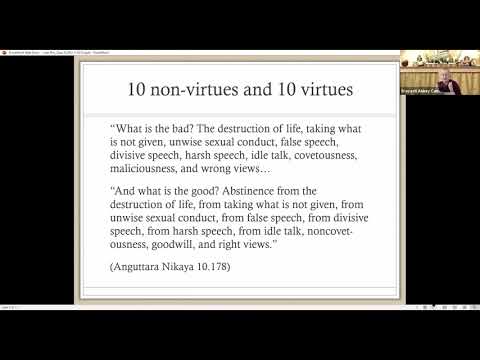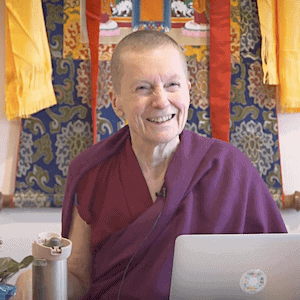The root afflictions: Ignorance
20 Samsara, Nirvana, and Buddha Nature
Part of an ongoing series of teachings (retreat and Friday) based on the book Samsara, Nirvana, and Buddha Nature, the third volume in The Library of Wisdom and Compassion series by His Holiness the Dalai Lama and Venerable Thubten Chodron.
- Lack of clarity regarding four truths, three jewels and karma and its effects
- A mental factor, basis for all other afflictions
- Definition of ignorance in different tenet systems
- Difference between ignorance and confusion
- Not understanding selflessness of a person
- Not knowing the ultimate mode of existence of persons and phenomena
- Disbelief or disregard for karma and its effects
- One of the three poisons, first link of dependent origination, four distorted conceptions
- Self-grasping ignorance and afflictions
- Deluded doubt leans towards a wrong conclusion about dharma topics
Samsara, Nirvana, and Buddha Nature 20: Ignorance (download)
Contemplation points
- Ignorance can mean confusion about karma and its effects or grasping at true existence. Describe what each of these types of ignorance is in your own words. Why is it important to be able to differentiate between the two?
- Views we hold can steer us in a wrong direction. Think of a personal example where a wrong view led you to act in a way that created negative karma.
- In what ways do you doubt yourself or your spiritual practice? Take some time to lay out why that doubt exists and how you might go about changing it?
- Review each of the five afflictions discussed in this and previous teachings one by one. Think of at least three instances when each affliction has arisen in your mind. What were the bare facts of the situation that sparked it? What did distorted attention add on to these bare facts, for example, by imputing qualities onto the object or person? What effect did that action have on your mind? How did it influence your deeds and words? Which Dharma points or teachings would help you subdue that affliction?
Venerable Thubten Chodron
Venerable Chodron emphasizes the practical application of Buddha’s teachings in our daily lives and is especially skilled at explaining them in ways easily understood and practiced by Westerners. She is well known for her warm, humorous, and lucid teachings. She was ordained as a Buddhist nun in 1977 by Kyabje Ling Rinpoche in Dharamsala, India, and in 1986 she received bhikshuni (full) ordination in Taiwan. Read her full bio.


